The social economic circumstances for the presidential elections in Belarus are extremely unfavourable for the authorities. Recession, decline in living standards and no reforms in sight, have caused popular protests and a wish for change. The risk of the regime falling, however, is still pretty low. Re-elected, a weakened president Lukashenka, may be forced to resort to increased Russian subsidies and thus severely limit the sovereignty of his country, argues Kamil Kłysiński of the Center for Eastern Studies (OSW) in Warsaw.
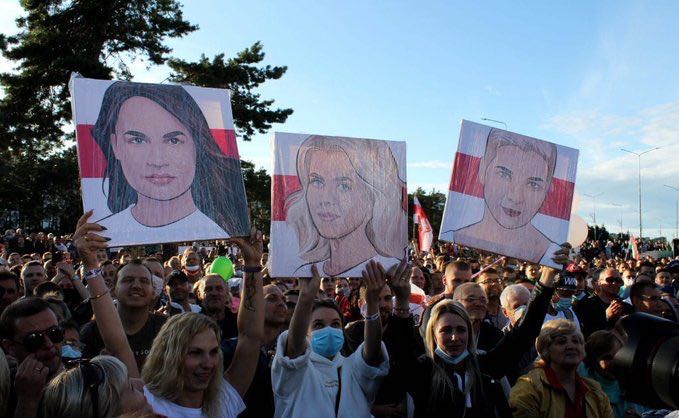 Meeting with opposition candidates in Belarus.Picture from Twitter
Meeting with opposition candidates in Belarus.Picture from Twitter
by Kamil Kłysiński
The presidential elections in Belarus scheduled for 9 August are being held in extremely unfavourable conditions for the authorities. The reduction of Russian subsidies related to the dispute between Minsk and Moscow over further integration, as well as the coronavirus pandemic, have led the domestic economy into recession, a situation which has been additionally exacerbated by the authoritarian regime's inability to introduce economic reforms.
The negative trends in the economy have been accompanied by the growing dissatisfaction of the public, who feel that their standard of living is falling. The public mood has also been aggravated by the disrespectful attitude of the government, including the president, towards the COVID-19 threat. A general feeling of insecurity regarding public health is thus also contributing to the tense mood.
As a result, during the course of the election campaign launched in May, the Belarusian people, who had hitherto been perceived as politically passive, decided to express their dissatisfaction with the regime in public. Proof of this includes the unprecedentedly strong support for the most popular opponents of Alyaksandr Lukashenka [in Russian: Aleksandr Lukashenko], in particular Sviatlana Tsikhanouskaya [Svetlana Tikhanovskaya], who is running as a substitute for her husband Siarhei [Sergey], a popular blogger and radical critic who was arrested at the end of May.
Despite the lack of any clear signs that a revolution is imminent, there is a risk that the scenario of the December 2010 elections could be repeated, when the violent pacification of demonstrations in the centre of Minsk by citizens protesting electoral fraud led to a break in dialogue with the West and an increase in the influence of Russia, which was striving for full domination over Belarus. So for Lukashenka, who is running for re-election for the fifth time, de-escalating the social tensions currently being witnessed is a key challenge for his campaign.
Controlled voting process
The government brought about the increased public activity by tightening its control over the voting process. Only six representatives of opposition political parties (less than a fifth of the number permitted in the 2015 elections) have been admitted onto the electoral committees formed in June, out of more than 60,000 available positions. On 14 July, the Central Electoral Commission refused to register Lukashenka's two main opponents – Viktar Babaryka [Viktor Barbaryko and Valery Tsepkalo] – despite the fact that the former had collected 430,000 signatures (an unprecedented level of support for an alternative candidate to Lukashenka in the history of independent Belarus), and the latter 160,000.
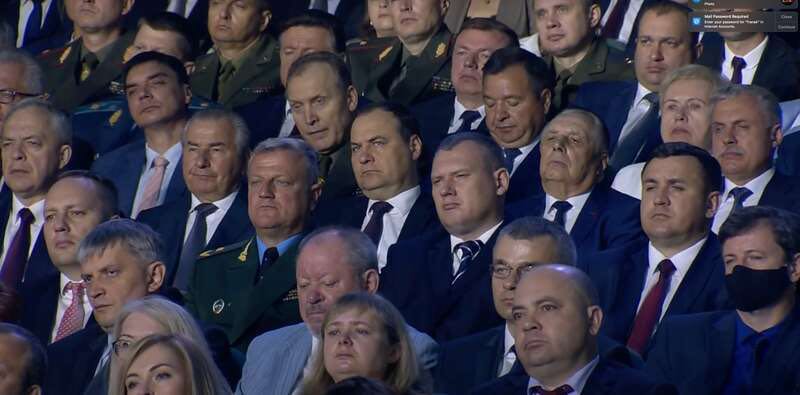 The ruling elite listens to president Lukashenka giving an election speech on August 4. Picture from Twitter
The ruling elite listens to president Lukashenka giving an election speech on August 4. Picture from Twitter
The most radical and popular participants in this campaign, including Babaryka and the charismatic blogger Tsikhanouski [Tikhanovsky], have been arrested and are facing sentences of at least several years' imprisonment. Tsapkala, for his part, fled to Russia [and last week from Russia to Kyiv, ed.] out of fear for his children's safety. The only person actively conducting a campaign is the arrested blogger's wife, Sviatlana Tsikhanouskaya, who herself has no political experience, and is being supported by the teams of the unregistered candidates. Despite not having a specific programme, her rallies have been attracting thousands of people, who are looking for any alternative to Lukashenka.
Rhetoric about external threat
The government, lacking financial reserves, has been unable to improve its image by raising wages or social benefits, and so it has primarily resorted to rhetoric about an external threat, pointing to Russia and, to a lesser extent, Western-inspired 'colour revolutions'. Any attempt to manifest opposition to the regime's actions evokes an immediate and brutal reaction from the security forces, and the registered candidates have had very limited opportunities to campaign. Meanwhile, Lukashenka has confined his own campaigning to meetings with the elites in individual regions and visits to top-level military units, during which he has announced that he will react to any street demonstrations with decisive force.
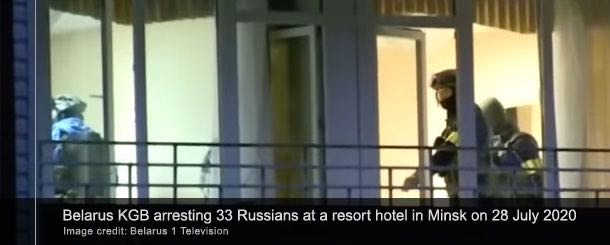
At the same time, the president is tightening his control over the country's nomenklatura, as evidenced by the exceptionally high sentence of 12 years' imprisonment handed down to Col. Andrey Vtiurin, the former head of presidential security and deputy head of the Security Council of the Republic of Belarus, for receiving US$190,000 in property benefits from Russian telecommunications companies.
The economy in recession
At the start of this year, Belarus recorded a decline in GDP which reversed the slight upward trend of the previous three years (1-3% annually). Initially, this had been caused by a reduction in Russian oil supplies to the Belarusian petrochemical industry (which on average earns the country 10% of its export revenues); the root of this was a political dispute over the scope of Russian-Belarusian integration. The negative trend in the Belarusian economy was deepened by the downturn on global markets caused by the coronavirus pandemic, including in countries that import Belarusian petroleum products (the Netherlands, the UK, Ukraine) as well as other important export goods such as potassium fertilisers (China, Brazil). And although the economic effects of COVID-19 have been felt globally, Belarus – due to its weak domestic demand, high export orientation (over 50% of GDP) and dependence on Russian subsidies – has found itself in the group of countries which are most threatened by recession.
As a result, the drop in GDP in the first half of this year amounted to 1.7%, and according to forecasts by international financial institutions it may reach 6% by the end of the year. The situation is further aggravated by the fact that the country's economic model is very outdated, based as it still is on the Soviet command-and-distribution model and central planning. Over 60% of industrial production and GDP is still generated by the state sector, which requires deep restructuring. However, all reform proposals have been blocked by Lukashenka, who fears a weakening of the authoritarian system of power.
The regime's conservative stance not only preserves the unprofitable economic model, but also blocks any possibility of obtaining stabilisation loans, e.g. from the International Monetary Fund. As a result, in order to ensure that the country's foreign debt keeps being smoothly serviced (this year's figures amount to US$4 billion), in June the Belarusian government was forced to issue Eurobonds worth US$1.25 billion at an interest rate of 5-6%, which is much higher than those issued by more financially reliable states, and than the loans offered by international financial institutions.
Pessimistic mood
The fact that economic reforms have been blocked for years, together with the recession observed since the beginning of this year, means that a significant part of the Belarusian public has noted a decline in their living standards. According to statistical data, the average salary hovers around US$500, the same as in 2010, while prices have continued to rise. It should also be noted that a significant part of society earns an income of only around US$200–300.
The COVID-19 epidemic has made the public's difficult situation even worse, as shown in a survey by the independent opinion research centre SATIO conducted at the start of April; it showed very high levels of pessimism in assessing both the people's own living situation and the state of the country's economy. And although there is a lack of more recent research, it seems that the public's negative assessment of the present situation may have only deepened, especially in the context of the reports over recent months of serious problems in many sectors of the country's economy (such as tourism, the food industry, transport and trade), as well as the need to close the border with Russia compelled by the pandemic; this has forced many Belarusians employed there (perhaps up to 600,000 persons) to return to their home country, and these people now have no other sources of income.
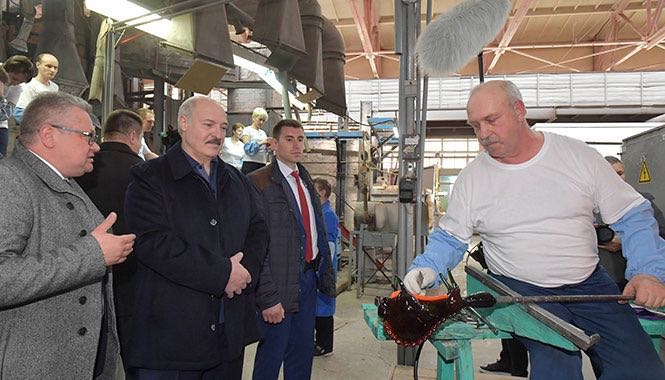 President Lukashenka was dismissive about the risks of corona. Here he visits a factory in April. Photo
President Lukashenka was dismissive about the risks of corona. Here he visits a factory in April. Photo
An additional factor influencing the public mood in the country is the disrespectful attitude which the government has displayed towards the COVID-19 pandemic from the start. Lukashenka ostentatiously downplayed the problem, and so no major restrictions were introduced to limit the spread of the coronavirus. Any accurate assessment of the scale of the dissatisfaction has been hindered by the lack of independent sociological research on voting preferences and the public's assessment of the political situation. Nevertheless, according to fragmentary data made available to the media from a survey conducted in April by the Institute of Sociology of the National Academy of Sciences of Belarus, the president is trusted by only 24% of the capital's inhabitants.
The election campaign launched in May, in which candidates new to politics are participating, has therefore proved to be an effective catalyst for the anger of a significant number of Belarusians living both in Minsk, already known for its discontent with the regime, and in much smaller towns, who had previously formed the bedrock of Lukashenka's electorate. As a result, we can now say that the authority of the current president is undergoing an advanced process of erosion; he is increasingly losing his image as the defender of ordinary people and the guarantor of social and health security that he has built up over the years, and is becoming the embodiment of an anachronistic authoritarianism, unable to adapt or implement any systemic reforms.
Lukashenka has still some room for manoeuvre
Considering the deepening recession in the economy and the rising social discontent, the international situation is still actually quite favourable from the point of view of the regime's interests. Despite the wave of repression against Lukashenka's opponents and the exclusion of some of them from the campaign, both the EU and the US are still in dialogue with Minsk, limiting themselves to criticising the authorities' actions. At the same time, Washington has been making politically important gestures of support, for example by organising oil supplies to Belarusian refineries.
As a result, Belarus still has room for manoeuvre with regard to Russia, which is still working to deepen the two countries' integration within the Union State. On the other hand, despite repeated accusations by Belarus of interfering in its elections , Moscow has not taken any radical measures and has guaranteed its neutral attitude towards the process. At the same time, although the project for deeper Russian-Belarusian integration which the Kremlin has been pushing since the end of 2018 (whose assumptions include the adoption of a common legal and tax system) has been blocked by Minsk, Moscow has recently eased the terms of repayment for the loan Belarus took for the construction of a nuclear power plant in Astraviets, and accepted a request for compensation of bonuses paid by Belarusian importers to Russian oil suppliers (this compensation will be paid from the Russian federal budget).
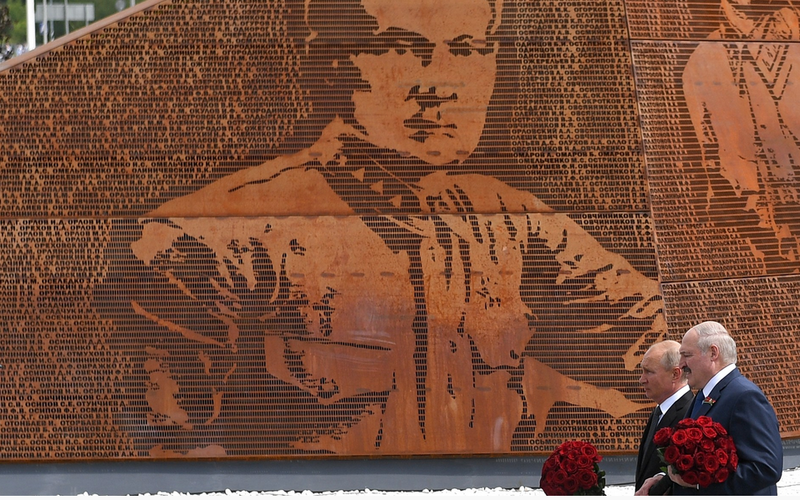 Lukashenka at the unveiling of a WW2 monument in Rzhev on 30 June. Photo Kremlin
Lukashenka at the unveiling of a WW2 monument in Rzhev on 30 June. Photo Kremlin
In addition, Lukashenka was invited to the parade in Moscow commemorating the 75th anniversary of the victory in World War II (which had been postponed to 24 June), and to the unveiling of a monument to a Soviet soldier in Rzhev on 30 June. In the above situation, it is difficult to say that the actions of either the West or Russia will hinder Lukashenka's successful re-election in any way, although if the social tensions in Belarus begin to escalate, the apparent lack of external threats to the regime may prove to be illusory.
The price of another re-election
It seems that nothing stands in the way of another decisive victory for the incumbent president, achieved with the help of force by the state apparatus. However, the unresolved problems concerning the public's standard of living, along with a growing sense of public fatigue at Lukashenka's long rule and indignation at the repression by his regime, may lead to mass demonstrations following the announcement of rigged election results. The substantial public response to Tsikhanouskaya's largely improvised campaign indicates a great demand for change.
Nevertheless, it should be emphasised that there are still no clear signs of revolutionary mood among the Belarusian people. The leaderless, spontaneous protests observed in this campaign (which were mainly linked to the repression against Babaryka, the most popular candidate) died out after a few days after the security forces took action against them. The risk of the regime falling is thus still pretty low, especially as there is no sign of any fractures within the ruling elite, which is one of the decisive factors in the effectiveness of a revolution.
Regardless of the scale and effectiveness of the protests, however, if the authorities' only reaction to them is brutal pacification and another wave of repression thereafter, dialogue with the West may be limited or even broken off. In this way, the position of Russia, which is aiming to deepen its integration with Belarus as part of the Union State, will be strengthened. At that point Lukashenka, in order to survive – and without the support of the majority of society or a strong economy – may be forced to ask for increased Russian subsidies at the cost of strategic concessions to the Kremlin's demands, which will severely limit Belarus's sovereignty.
This article was published originally by the Center for Eastern Studies in Warsaw, OSW
